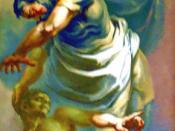Original sin is a complex theological. Augustine's pear parable addresses the root in a spiritual context. Augustine contends that in striving for the holy, one may attempt to make oneself as God. All sins which may be committed are perversions of a virtue which maybe found pure--in God. Augustine says "Ambition seeks nothing but honours and glory, whereas you alone are worthy of honour above all things, and your glory endures for ever" (2.6.13).
Augustine is particularly conscious the ambitious path is not the way. His parents worked to give him the best education so he could pursue literary aspirations. However, he discovered "...wherever my inclinations took me, a dark cloud came between me and the clear skies of your truth; and out of my abundance came forth my wickedness (Ps. 73-4 [Ps.72.7])" (2.3.7).
Augustine's easy life was filled with debauchery. He reasoned these two elements were related.
Since he had everything he needed, he was free to choose his path as he would. He chose women and thievery. Looking back he realized his earthly aspirations were fueled by the easy live he lived. In his devotion to his own achievement, Augustine placed himself in much the same position the fallen angel, Lucifer, had. He was attempting to be like God, and take over from Him.
It was not the stolen pears Augustine enjoyed so much as the taste of power he felt by imitating God, who is all-powerful. However, in this imitation, Augustine realized he had in fact negated God. He accuses and questions his action: "You had no beauty, being a theft. Are you indeed anything at all, that I can address you in this way?" (2.6.12). "Being; in so far as something is evil, it ceases to participate in goodness,



Well done
this was a nice short essay. i really liked the structure of the paper, as well as the presentation of the arguments. they were nicely presented and argued for. thank you for posting
1 out of 1 people found this comment useful.